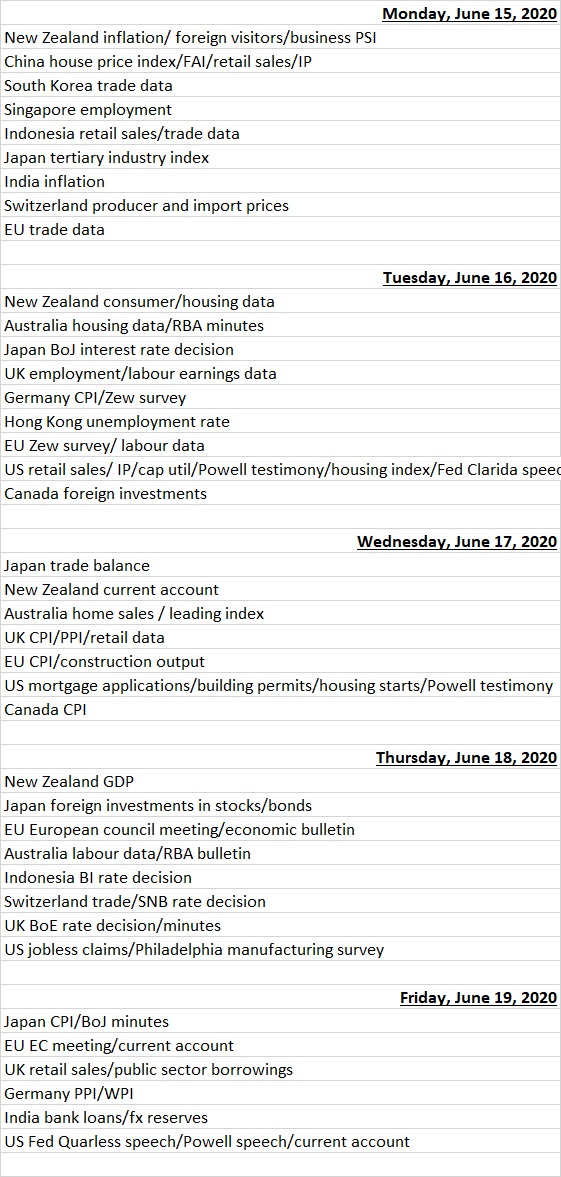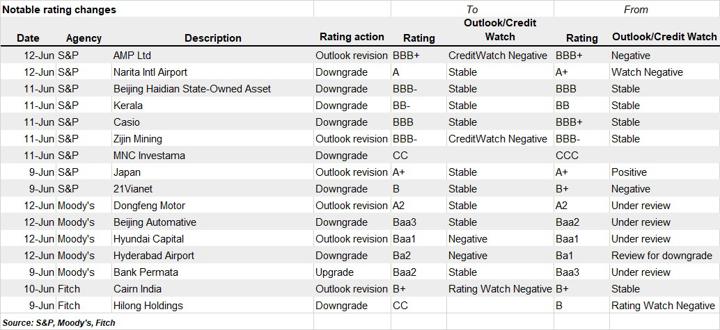Economic events
(ATF) Financial markets this week will watch industrial production and retail sales data for the US and China, as investors look for manufacturing and consumer trends in the world’s two largest economies.
“Industrial production and retail sales data for the US are updated for May, and will be eagerly awaited for confirmation that the worst of the economic downturn from the pandemic has passed,” Chris Williamson, chief business economist for IHS Markit said.
“In Asia, the focus is on China with production and retail sales data eagerly awaited to assess the extent to which economic activity may be recovering after the relatively early relaxation of virus restrictions. Surveys show domestic demand driving the rebound in China, with trade dragging.”
Investors are also worried about the other “second wave” – renewal of US-China trade tensions.
“We agree that the economic and health crises have likely accelerated the possibility of a breakdown in the relationship between the US and China,” Matt Gertken, geopolitical strategist at BCA Research, said.
“The risk will likely reach a new height in the summer, when pressure on Trump’s election campaign intensifies leading up to the vote in November. While there is a growing bipartisan hawkish view on China in Washington, China is also playing a part in fanning the flames.”
EC Recovery Fund
European policymakers will also be eyed as the EU summit discusses the Recovery Fund proposal.
“Positions have been taken with the countries usually critical of burden-sharing demanding a smaller size and not grants but loans to be distributed to the harder-hit member states and sectors. We view the Commission proposal mainly as a starting point for the negotiations and think it is by no means a certainty that a deal will be struck this week,” ING Bank economists said in a note.
EU leaders have so far failed, to agree on a common stance on the ?750-billion fund. Fiscally conservative members of the bloc, like the eastern V4 countries have voiced their view to avoid a situation wherein a country with more or less the same population and more or less the same GDP per capita situated in southern Europe will profit from the programme far more than a central European country.
BoJ meet, Powell to address Congress
The Bank of Japan meets next Monday-Tuesday in a two-day meeting and there is the expectation the central bank will expand its lending programme further.
“With the BoJ seemingly limited in broad-based monetary easing options, fiscal policy is taking the lead to support the economy. Indeed, the second supplementary budget of 31.9-trillion yen is now under deliberation at the Diet and the Japanese government is set to record the largest primary fiscal deficit in history,” HSBC economists James Lee and Ki-Hyuk Lee said in a note.
“As such, net Japanese Government Bond issuance is set to widen to 145.3 trillion yen in FY2020, from 44.5 trillion yen in FY2019. This may result in a faster pace of purchases by the BoJ later this year under its YCC regime.”
The BOJ is widely expected to stay pat on its benchmark rate.
After the US Federal Reserve signalled there was a need to maintain zero interest rates through at least 2022, chairman Jay Powell will deliver his semi-annual monetary policy report and testimony to Congress on Tuesday and Wednesday amid wide expectations he will push for more fiscal support for the economy.
Fund flows
Equity funds received a boost from US jobs data and European stimulus hopes, while money markets saw outflows on the back of that optimism, fund flows data provider EPFR said.
“In the US the pace of unemployment claims continues to slow, and May’s job report showed a surprising – albeit modest – rebound in job creation, while Germany’s recently announced $1.5-trillion stimulus package has boosted hopes that European policy-makers will find common ground in combating the economic effects of the current pandemic,” it said in a statement, adding that equity funds hit a two-month high during the week ending June 10, while money market funds posted consecutive outflows for the first time since mid-February.
But the biggest collective outflow from Asia ex-Japan equity funds since the third quarter of 2015 ensured that EPFR-tracked Emerging Markets equity funds posted their 17th consecutive outflow. China equity funds extended their longest run of outflows since the third quarter of 2017 while redemptions from Hong Kong equity funds climbed to a 45-week high.
“Investors continue to take a redeem-and-see approach to the tensions surrounding China’s trade disputes with the US and its more assertive approach towards Hong Kong,” it said.
But bond fund inflows continued and that category received $24.6 billion, its second largest inflow on record as the European Central Bank stepped up its monetary stimulus program and the US Federal Reserve indicated that there was little chance of an interest rate hike until 2022.
“Investors across Europe have added risk at an unprecedented rate,” BofA Securities said in a note. “IG and HY ETF funds have enjoyed record inflows last week, and IG funds recorded their largest inflow ever at almost $10 billion. Fixed income funds have also seen new record inflows, increasing further week-on-week. This was driven by accelerating inflows into credit funds amid a lack of yield across the government bond market. Emerging Market debt has also benefited from a reach for yield and stronger EM FX, while equity funds have seen a revival of inflows recently.”
Economic data calendar

Last week’s rating changes

























